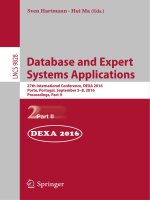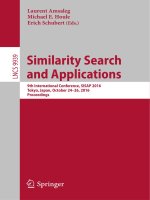Business process management 14th international conference, BPM 2016
Bạn đang xem bản rút gọn của tài liệu. Xem và tải ngay bản đầy đủ của tài liệu tại đây (29.31 MB, 449 trang )
LNCS 9850
Marcello La Rosa · Peter Loos
Oscar Pastor (Eds.)
Business Process
Management
14th International Conference, BPM 2016
Rio de Janeiro, Brazil, September 18–22, 2016
Proceedings
123
Lecture Notes in Computer Science
Commenced Publication in 1973
Founding and Former Series Editors:
Gerhard Goos, Juris Hartmanis, and Jan van Leeuwen
Editorial Board
David Hutchison
Lancaster University, Lancaster, UK
Takeo Kanade
Carnegie Mellon University, Pittsburgh, PA, USA
Josef Kittler
University of Surrey, Guildford, UK
Jon M. Kleinberg
Cornell University, Ithaca, NY, USA
Friedemann Mattern
ETH Zurich, Zürich, Switzerland
John C. Mitchell
Stanford University, Stanford, CA, USA
Moni Naor
Weizmann Institute of Science, Rehovot, Israel
C. Pandu Rangan
Indian Institute of Technology, Madras, India
Bernhard Steffen
TU Dortmund University, Dortmund, Germany
Demetri Terzopoulos
University of California, Los Angeles, CA, USA
Doug Tygar
University of California, Berkeley, CA, USA
Gerhard Weikum
Max Planck Institute for Informatics, Saarbrücken, Germany
9850
More information about this series at />
Marcello La Rosa Peter Loos
Oscar Pastor (Eds.)
•
Business Process
Management
14th International Conference, BPM 2016
Rio de Janeiro, Brazil, September 18–22, 2016
Proceedings
123
Editors
Marcello La Rosa
Queensland University of Technology
Brisbane, QLD
Australia
Oscar Pastor
Universidad Politècnica de Valencia
Valencia
Spain
Peter Loos
DFKI
Universität des Saarlandes
Saarbrücken, Saarland
Germany
ISSN 0302-9743
ISSN 1611-3349 (electronic)
Lecture Notes in Computer Science
ISBN 978-3-319-45347-7
ISBN 978-3-319-45348-4 (eBook)
DOI 10.1007/978-3-319-45348-4
Library of Congress Control Number: 2015957799
LNCS Sublibrary: SL3 – Information Systems and Applications, incl. Internet/Web, and HCI
© Springer International Publishing Switzerland 2016
This work is subject to copyright. All rights are reserved by the Publisher, whether the whole or part of the
material is concerned, specifically the rights of translation, reprinting, reuse of illustrations, recitation,
broadcasting, reproduction on microfilms or in any other physical way, and transmission or information
storage and retrieval, electronic adaptation, computer software, or by similar or dissimilar methodology now
known or hereafter developed.
The use of general descriptive names, registered names, trademarks, service marks, etc. in this publication
does not imply, even in the absence of a specific statement, that such names are exempt from the relevant
protective laws and regulations and therefore free for general use.
The publisher, the authors and the editors are safe to assume that the advice and information in this book are
believed to be true and accurate at the date of publication. Neither the publisher nor the authors or the editors
give a warranty, express or implied, with respect to the material contained herein or for any errors or
omissions that may have been made.
Printed on acid-free paper
This Springer imprint is published by Springer Nature
The registered company is Springer International Publishing AG Switzerland
Preface
The 14th International Conference on Business Process Management (BPM 2016)
provided a global forum for researchers, practitioners, and developers to meet and
exchange research insights and outcomes in business process management. BPM 2016
was hosted by the Federal University of the State of Rio de Janeiro, and took place
during September 18–22 in Rio de Janeiro, Brazil.
We received 128 full submissions. Each paper was reviewed by at least four
Program Committee (PC) members, and by one senior PC member who moderated the
discussion and wrote the meta-review. Overall, the review process involved 20 senior
PC members and 89 PC members. We accepted 22 papers (17.2 % acceptance rate).
A subset of these papers was first conditionally accepted and underwent a thorough
revision with subsequent review by a senior PC member. The rigorous review process
and the high quality of the papers published in this volume attest to the leading position
of the BPM Conference in this research discipline, globally.
In addition, we selected 13 papers from those that were not accepted, and invited
them to the “BPM Forum.” The BPM Forum is a new sub-track of the BPM Conference that aims to host innovative yet not mature research with high potential of
stimulating discussions at the conference. These papers are published in a separate
volume in the Springer LNBIP series.
This year we explicitly encouraged papers that report on interdisciplinary aspects of
BPM and on research in emerging BPM areas, as well as papers that advance
knowledge in the areas of business process analysis and improvement. Out of the
submissions on these and on the traditional subject areas of BPM research, we selected
a range of papers focusing on automated discovery, conformance checking, modeling
foundations, understandability of process representations, runtime management, and
predictive monitoring. The topics selected by the authors demonstrate the increasing
interest of the research community in the area of process mining, resonated, these days,
by an equally fast-growing uptake of process mining by different industry sectors.
The scientific program was complemented by three keynotes, chosen to provide a
perspective from within the core BPM research community (Richard Hull, IBM T.
J. Watson Research Center), from the BPM industry (Bradford Power, CXcelerator/
FCB Partners), and from adjacent areas to the BPM research community (Giancarlo
Guizzardi, Federal University of Espírito Santo).
We would like to thank the PC and the broader reviewer community for their
dedicated commitment, and in particular the senior PC members for moderating the
review process and preparing recommendations to the PC chairs. We are most grateful
to all those who were involved in the realization of the conference, including the chairs
of the various tracks. We would also like to congratulate the authors of all submitted
and accepted papers for their high-quality work, and thank them for choosing BPM as
their outlet for publication.
VI
Preface
Finally, we would like to thank the BPM 2016 Organizing Committee and in
particular the general chair, Flavia Maria Santoro, for their efforts in making this
conference possible. We also thank the sponsors, Bizagi, IBM, DCR, myInvenio,
UniRio, grupo A, Springer, ABPMP Brazil and SBC, for their generous support.
We hope that you will enjoy reading the papers in this volume and that you will be
inspired by them to contribute to the next editions of the BPM Conference.
September 2016
Marcello La Rosa
Peter Loos
Oscar Pastor
Organization
BPM 2016 was organized by the Federal University of the State of Rio de Janeiro, and
took place in Rio de Janeiro, Brazil.
Steering Committee
Wil van der Aalst (Chair)
Boualem Benatallah
Jörg Desel
Schahram Dustdar
Marlon Dumas
Manfred Reichert
Stefanie Rinderle-Ma
Barbara Weber
Mathias Weske
Michael zur Muehlen
Eindhoven University of Technology, The Netherlands
University of New South Wales, Australia
University of Hagen, Germany
Vienna University of Technology, Austria
University of Tartu, Estonia
University of Ulm, Germany
University of Vienna, Austria
Technical University of Denmark, Denmark
HPI, University of Potsdam, Germany
Stevens Institute of Technology, USA
Executive Committee
General Chair
Flavia Maria Santoro
Federal University of the State of Rio de Janeiro, Brazil
Program Chairs
Marcello La Rosa
Peter Loos
Oscar Pastor
Queensland University of Technology, Australia
DFKI/Saarland University, Germany
Universitat Politècnica de València, Spain
Industry Chairs
Claudia Cappelli
Silvia Inês Dallavalle
de Pádua
André Macieira
Michael Rosemann
Federal University of the State of Rio de Janeiro, Brazil
University of São Paulo, Brazil
Elo Group, Brazil
Queensland University of Technology, Australia
Workshop Chairs
Marlon Dumas
Marcelo Fantinato
University of Tartu, Estonia
University of São Paulo, Brazil
Tutorial and Panel Chairs
Manfred Reichert
Lucinéia Heloisa Thom
University of Ulm, Germany
Federal University of Rio Grande do Sul, Brazil
VIII
Organization
Demonstration Chairs
Leonardo Azevedo
Cristina Cabanillas
IBM Research/Federal University of Rio de Janeiro
State, Brazil
Vienna University of Economics and Business, Austria
Doctoral Consortium Chairs
Fernanda Baião
Hajo A. Reijers
Federal University of the State of Rio de Janeiro, Brazil
VU University Amsterdam, The Netherlands
Latin-American BPM Workshop
Juliano Lopes de Oliveira
José Pino
Pablo D. Villarreal
Federal University of Goiás, Brazil
Universidad de Chile, Chile
National Technological University, Argentina
BPM in Public Administration Panel Chair
Carina Frota Alves
Federal University of Pernambuco, Brazil
Publicity Chairs
José Ricardo Cereja
Valdemar T.F. Confort
Kate Revoredo
Ricardo Seguel
Federal University of the State of Rio de Janeiro, Brazil
Federal University of the State of Rio de Janeiro, Brazil
Federal University of the State of Rio de Janeiro, Brazil
BPM LATAM S.A., Chile
Senior Program Committee
Josep Carmona
Florian Daniel
Jörg Desel
Avigdor Gal
Pericles Loucopoulos
Heinrich C. Mayr
Massimo Mecella
Jan Mendling
Andreas Oberweis
Hajo A. Reijers
Stefanie Rinderle-Ma
Michael Rosemann
Shazia Sadiq
Pnina Soffer
Jianwen Su
Farouk Toumani
Boudewijn van Dongen
Barbara Weber
Matthias Weidlich
Mathias Weske
Universitat Politècnica Catalunya, Spain
Politecnico di Milano, Italy
Fernuniversität in Hagen, Germany
Technion, Israel
University of Manchester, UK
Alpen-Adria-Universität Klagenfurt, Austria
SAPIENZA Università di Roma, Italy
Vienna University of Economics and Business, Austria
Universität Karlsruhe, Germany
VU University Amsterdam, The Netherlands
University of Vienna, Austria
Queensland University of Technology, Australia
The University of Queensland, Australia
University of Haifa, Israel
University of California at Santa Barbara, USA
LIMOS/Blaise Pascal University, France
Eindhoven University of Technology, The Netherlands
Technical University of Denmark, Denmark
Humboldt-Universität zu Berlin, Germany
HPI, University of Potsdam, Germany
Organization
IX
Program Committee
Mari Abe
Ahmed Awad
Hyerim Bae
Bart Baesens
Seyed-Mehdi-Reza Beheshti
Boualem Benatallah
Giorgio Bruno
Fabio Casati
Francisco Curbera
Massimiliano de Leoni
Jochen De Weerdt
Patrick Delfmann
Nirmit Desai
Remco Dijkman
Marlon Dumas
Schahram Dustdar
Johann Eder
Gregor Engels
Joerg Evermann
Dirk Fahland
Marcelo Fantinato
Peter Fettke
Walid Gaaloul
Luciano García-Bañuelos
Christian Gerth
Chiara Ghidini
Guido Governatori
Sven Graupner
Gianluigi Greco
Daniela Grigori
Thomas Hildebrandt
Richard Hull
Marta Indulska
Stefan Jablonski
Gabriel Juhas
Leonid Kalinichenko
Dimka Karastoyanova
Rania Khalaf
Jana Koehler
Agnes Koschmider
Jochen Kuester
Akhil Kumar
Geetika Lakshmanan
IBM Research, Japan
Cairo University, Egypt
Pusan National University, Republic of Korea
KU Leuven, Belgium
University of New South Wales, Australia
University of New South Wales, Australia
Politecnico di Torino, Italy
University of Trento, Italy
IBM Research, USA
Eindhoven University of Technology, The Netherlands
KU Leuven, Belgium
ERCIS, Germany
IBM T.J. Watson Research Center, USA
Eindhoven University of Technology, The Netherlands
University of Tartu, Estonia
TU Wien, Austria
Alpen Adria Universität Klagenfurt, Austria
University of Paderborn, Germany
Memorial University of Newfoundland, Canada
Eindhoven University of Technology, The Netherlands
University of São Paulo, Brazil
DFKI, Germany
Télécom SudParis, France
University of Tartu, Estonia
Osnabrück University of Applied Sciences, Germany
FBK-irst, Italy
Data61, Australia
Hewlett-Packard Laboratories, USA
University of Calabria, Italy
University of Paris-Dauphine, France
IT University of Copenhagen, Denmark
IBM T.J. Watson Research Center, USA
The University of Queensland, Australia
University of Bayreuth, Germany
Slovak University of Technology, Slovakia
Russian Academy of Science, Russian Federation
University of Stuttgart, Germany
IBM T.J. Watson Research Center, USA
Hochschule Luzern, Switzerland
Karlsruhe Institute of Technology, Germany
IBM Research, Switzerland
Penn State University, USA
Audible, USA
X
Organization
Ralf Laue
Henrik Leopold
Chengfei Liu
Rong Liu
Irina Lomazova
Heiko Ludwig
Fabrizio Maria Maggi
Marco Montali
Hamid Motahari
Juergen Muench
John Mylopoulos
Hye-Young Paik
Dietmar Pfahl
Artem Polyvyanyy
Frank Puhlmann
Mu Qiao
Manfred Reichert
Manuel Resinas
Gustavo Rossi
Maximilian Röglinger
Theresa Schmiedel
Heiko Schuldt
Marcos Sepúlveda
Sergey Smirnov
Minseok Song
Alessandro Sperduti
Stefan Strecker
Keith Swenson
Samir Tata
Ernest Teniente
Arthur ter Hofstede
Lucinéia Heloisa Thom
Peter Trkman
Roman Vaculin
Wil van der Aalst
Amy Van Looy
Irene Vanderfeesten
Hagen Völzer
Jianmin Wang
Ingo Weber
Lijie Wen
Karsten Wolf
University of Applied Sciences Zwickau, Germany
VU University Amsterdam, The Netherlands
Swinburne University of Technology, Australia
IBM Research, USA
National Research University Higher School
of Economics, Russian Federation
IBM Research, USA
University of Tartu, Estonia
Free University of Bozen-Bolzano, Italy
IBM Research, USA
University of Helsinki, Finland
University of Trento, Italy
University of New South Wales, Australia
University of Tartu, Estonia
Queensland University of Technology, Australia
Bosch Software Innovations, Germany
IBM Almaden Research Center, USA
University of Ulm, Germany
University of Seville, Spain
LIFIA, National University of La Plata, Argentina
Universität Bayreuth, Germany
University of Liechtenstein, Liechtenstein
University of Basel, Switzerland
Pontificia Universidad Católica de Chile, Chile
SAP Research, Germany
Ulsan National Institute of Science and Technology,
Republic of Korea
University of Padua, Italy
University of Hagen, Germany
Fujitsu, USA
Telecom SudParis/CNRS Samovar Lab, France
Unversitat Politècnica de Catalunya, Spain
Queensland University of Technology, Australia
Federal University of Rio Grande do Sul, Brazil
University of Ljubljana, Slovenia
IBM T.J. Watson Research Center, USA
Eindhoven University of Technology, The Netherlands
Ghent University, Belgium
Eindhoven University of Technology, The Netherlands
IBM Research, Switzerland
Tsinghua University, China
Data61, Australia
Tsinghua University, China
University of Rostock, Germany
Organization
Moe Wynn
Eric Yu
Liang Zhang
Michael zur Muehlen
Queensland University of Technology, Australia
University of Toronto, Canada
Fudan University, China
Stevens Institute of Technology, USA
Additional Reviewers
Kevin Andrews
Vasilios Andrikopoulos
Abel Armas Cervantes
Nour Assy
Vladimir Bashkin
Dina Bayomie
Khalid Belhajjame
Arne Bergmann
Mirela Madalina Botezatu
Federico Chesani
Jan Claes
Raffaele Conforti
Riccardo De Masellis
Johannes De Smedt
Adela Del Río Ortega
Claudio Di Ciccio
Chiara Di Francescomarino
Mortada El Bana
Jonnro Erasmus
Maria Fay
Valeria Fionda
Markus Fischer
Antonella Guzzo
Michael Hahn
Farideh Heidari
Iman Helal
Vatche Ishakian
Anna Kalenkova
Klaus Kammerer
Christopher Klinkmueller
Monika Klun
David Knuplesch
Julius Köpke
Sander Leemans
Patrick Lohmann
Xixi Lu
Annapaola Marconi
Alfonso Marquez-Chamorro
Alexey Mitsyuk
Jorge Munoz-Gama
Chun Ouyang
Jan Recker
Florian Rittmeier
Andrey Rivkin
Carlos Rodriguez
Kristina Rosenthal
Marco Roveri
Marc Schickler
Alexander Schmid
Johannes Schobel
Stefan Schönig
Simon Schwichtenberg
Zhe Shan
Tijs Slaats
Aleksander Slominski
Sebastian Steinau
Sergey Stupnikov
Alexander Teetz
Benjamin Ternes
Lucinéia Heloisa Thom
Sanja Tumbas
Han van der Aa
Sebastian Wagner
Andreas Weiß
Dennis Wolters
Xiwei Xu
Peifeng Yin
Sira Yongchareon
Jian Yu
Nesma Zaki
Jelena Zdravkovic
XI
XII
Sponsors
Organization
Abstract of Keynotes
Don’t Just Improve Work,
Innovate Continuously
Bradford Power1,2
1
CXcelerator, USA
FCB Partners, USA
2
Abstract. Process improvement (10 % incremental improvement, operational
excellence, continuous improvement, the Toyota Production System, Six Sigma,
Lean, kaizen, local optimization) is a strategic competency needed by every
organization, but it isn’t sufficient in today’s competitive world. As the business
world shifts from competing with physical assets and people to data and software, organizations become more and more dependent on process innovation
(10X innovation, radical change, design thinking, product and service disruption, incubation, end-to-end optimization). An example to show the evolution is
GE’s shift from Six Sigma to Lean Six Sigma to Lean Startup to competing on
software with Predix.
Historically, conventional wisdom said you could only be world class at one of
three value propositions: operational excellence, customer intimacy and product
leadership. Today, companies need all three to compete, particularly those that
are being disrupted by software startups and big software-based companies such
as Amazon, Facebook, and Google, which are in fact doing all three. How are
they doing it?
This keynote will discuss the major roadblocks to transitioning legacy organizations from continuous process improvement to continuous process innovation, and shed light on how these roadblocks can be lifted.
Featured guest appearance: Gian Martinez, a startup leader using the Coca-Cola
Founders Platform, will show how Coca-Cola is innovating through the example
of Winnin – a social media site where young people submit recommendations
that compete with each other.
Rethinking BPM in a Cognitive World:
Transforming How We Learn and Perform
Business Processes
Richard Hull1 and Hamid R. Motahari Nezhad2
1
IBM T.J. Watson Research Center, New York, USA
2
IBM Almaden Research Center, San Jose, USA
Abstract. If we are to believe the technology hype cycle, we are entering a new
era of Cognitive Computing, enabled by advances in natural language processing, machine learning, and more broadly artificial intelligence. These
advances, combined with evolutionary progress in areas such as knowledge
representation, automated planning, user experience technologies, software-asa-service and crowdsourcing, have the potential to transform many industries. In
this paper, we discuss transformations of BPM that advances in the Cognitive
Computing will bring. We focus on three of the most signficant aspects of this
transformation, namely: (a) Cognitive Computing will enable “knowledge
acquisition at scale”, which will lead to a transformation in Knowledge-intensive Processes (KiP’s); (b) We envision a new process meta-model will emerge
that is centered around a “Plan-Act-Learn” cycle; and (c) Cognitive Computing
can enable learning about processes from implicit descriptions (at both designand run-time), opening opportunities for new levels of automation and business
process support, for both traditional business processes and KiP’s. We use the
term cognitive BPM to refer to a new BPM paradigm encompassing all aspects
of BPM that are impacted and enabled by Cognitive Computing. We argue that
a fundamental understanding of cognitive BPM requires a new research framing
of the business process ecosystem. The paper presents a conceptual framework
for cognitive BPM, a brief survey of state of the art in emerging areas of
Cognitive BPM, and discussion of key directions for further research.
Ontological Considerations
About the Representation of Events
and Endurants in Business Models
Giancarlo Guizzardi1,2, Nicola Guarino2, and João Paulo A. Almeida1
1
Federal University of Espírito Santo, Vitória, Brazil
ISTC-CNR Laboratory for Applied Ontology, Trento, Italy
,
,
2
Abstract. Different disciplines have been established to deal with the representation of entities of different ontological natures: the business process
modeling discipline focuses mostly on event-like entities, and, in contrast, the
(structural) conceptual modeling discipline focuses mostly on object-like entities
(known as endurants in the ontology literature). In this paper, we discuss the
impact of the event vs. endurant divide for conceptual models, showing that a
rich ontological account is required to bridge this divide. Accounting for the
ontological differences in events and endurants as well as their relations can lead
to a more comprehensive representation of business reality.
Contents
Keynotes
Rethinking BPM in a Cognitive World: Transforming How We Learn
and Perform Business Processes . . . . . . . . . . . . . . . . . . . . . . . . . . . . . . . .
Richard Hull and Hamid R. Motahari Nezhad
3
Ontological Considerations About the Representation of Events
and Endurants in Business Models . . . . . . . . . . . . . . . . . . . . . . . . . . . . . .
Giancarlo Guizzardi, Nicola Guarino, and João Paulo A. Almeida
20
Automated Discovery
A Unified Approach for Measuring Precision and Generalization Based
on Anti-alignments . . . . . . . . . . . . . . . . . . . . . . . . . . . . . . . . . . . . . . . . .
B.F. van Dongen, J. Carmona, and T. Chatain
A Stability Assessment Framework for Process Discovery Techniques . . . . . .
Pieter De Koninck and Jochen De Weerdt
Measuring the Quality of Models with Respect to the Underlying System:
An Empirical Study. . . . . . . . . . . . . . . . . . . . . . . . . . . . . . . . . . . . . . . . .
Gert Janssenswillen, Toon Jouck, Mathijs Creemers, and Benoît Depaire
Handling Duplicated Tasks in Process Discovery by Refining Event Labels . . .
Xixi Lu, Dirk Fahland, Frank J.H.M. van den Biggelaar,
and Wil M.P. van der Aalst
Discovering Duplicate Tasks in Transition Systems for the Simplification
of Process Models. . . . . . . . . . . . . . . . . . . . . . . . . . . . . . . . . . . . . . . . . .
Javier de San Pedro and Jordi Cortadella
From Low-Level Events to Activities - A Pattern-Based Approach . . . . . . . .
Felix Mannhardt, Massimiliano de Leoni, Hajo A. Reijers,
Wil M.P. van der Aalst, and Pieter J. Toussaint
Discovering and Exploring State-Based Models for Multi-perspective
Processes . . . . . . . . . . . . . . . . . . . . . . . . . . . . . . . . . . . . . . . . . . . . . . . .
Maikel L. van Eck, Natalia Sidorova, and Wil M.P. van der Aalst
Semantical Vacuity Detection in Declarative Process Mining . . . . . . . . . . . .
Fabrizio Maria Maggi, Marco Montali, Claudio Di Ciccio,
and Jan Mendling
39
57
73
90
108
125
142
158
XX
Contents
Conformance Checking
In Log and Model We Trust? A Generalized Conformance Checking
Framework . . . . . . . . . . . . . . . . . . . . . . . . . . . . . . . . . . . . . . . . . . . . . . .
Andreas Rogge-Solti, Arik Senderovich, Matthias Weidlich,
Jan Mendling, and Avigdor Gal
A Recursive Paradigm for Aligning Observed Behavior of Large Structured
Process Models. . . . . . . . . . . . . . . . . . . . . . . . . . . . . . . . . . . . . . . . . . . .
Farbod Taymouri and Josep Carmona
179
197
Modeling Foundations
Semantics and Analysis of DMN Decision Tables . . . . . . . . . . . . . . . . . . . .
Diego Calvanese, Marlon Dumas, Ülari Laurson, Fabrizio M. Maggi,
Marco Montali, and Irene Teinemaa
217
Dynamic Skipping and Blocking and Dead Path Elimination for Cyclic
Workflows . . . . . . . . . . . . . . . . . . . . . . . . . . . . . . . . . . . . . . . . . . . . . . .
Dirk Fahland and Hagen Völzer
234
The Complexity of Deadline Analysis for Workflow Graphs with Multiple
Resources. . . . . . . . . . . . . . . . . . . . . . . . . . . . . . . . . . . . . . . . . . . . . . . .
Mirela Botezatu, Hagen Völzer, and Lothar Thiele
252
Understandability of Process Representations
Dealing with Behavioral Ambiguity in Textual Process Descriptions . . . . . . .
Han van der Aa, Henrik Leopold, and Hajo A. Reijers
The Effect of Modularity Representation and Presentation Medium
on the Understandability of Business Process Models in BPMN . . . . . . . . . .
Oktay Turetken, Tessa Rompen, Irene Vanderfeesten, Ahmet Dikici,
and Jan van Moll
Towards Quality-Aware Translations of Activity-Centric Processes
to Guard Stage Milestone. . . . . . . . . . . . . . . . . . . . . . . . . . . . . . . . . . . . .
Julius Köpke and Jianwen Su
271
289
308
Runtime Management
Untrusted Business Process Monitoring and Execution Using Blockchain. . . .
Ingo Weber, Xiwei Xu, Régis Riveret, Guido Governatori,
Alexander Ponomarev, and Jan Mendling
329
Contents
Classification and Formalization of Instance-Spanning Constraints
in Process-Driven Applications . . . . . . . . . . . . . . . . . . . . . . . . . . . . . . . . .
Walid Fdhila, Manuel Gall, Stefanie Rinderle-Ma, Juergen Mangler,
and Conrad Indiono
Value at Risk Within Business Processes: An Automated IT Risk
Governance Approach . . . . . . . . . . . . . . . . . . . . . . . . . . . . . . . . . . . . . . .
Oscar González-Rojas and Sebastian Lesmes
XXI
348
365
Prediction
PRISM – A Predictive Risk Monitoring Approach for Business Processes . . .
Raffaele Conforti, Sven Fink, Jonas Manderscheid,
and Maximilian Röglinger
Predictive Business Process Monitoring with Structured and Unstructured
Data . . . . . . . . . . . . . . . . . . . . . . . . . . . . . . . . . . . . . . . . . . . . . . . . . . .
Irene Teinemaa, Marlon Dumas, Fabrizio Maria Maggi,
and Chiara Di Francescomarino
P3 -Folder: Optimal Model Simplification for Improving Accuracy
in Process Performance Prediction. . . . . . . . . . . . . . . . . . . . . . . . . . . . . . .
Arik Senderovich, Alexander Shleyfman, Matthias Weidlich,
Avigdor Gal, and Avishai Mandelbaum
Author Index . . . . . . . . . . . . . . . . . . . . . . . . . . . . . . . . . . . . . . . . . . . .
383
401
418
437
Keynotes
Rethinking BPM in a Cognitive World:
Transforming How We Learn and Perform
Business Processes
Richard Hull1(B) and Hamid R. Motahari Nezhad2
1
IBM T.J. Watson Research Center, New York, USA
2
IBM Almaden Research Center, San Jose, USA
Abstract. If we are to believe the technology hype cycle, we are entering a new era of Cognitive Computing, enabled by advances in natural
language processing, machine learning, and more broadly artificial intelligence. These advances, combined with evolutionary progress in areas
such as knowledge representation, automated planning, user experience
technologies, software-as-a-service and crowdsourcing, have the potential
to transform many industries. In this paper, we discuss transformations
of BPM that advances in the Cognitive Computing will bring. We focus
on three of the most signficant aspects of this transformation, namely:
(a) Cognitive Computing will enable “knowledge acquisition at scale”,
which will lead to a transformation in Knowledge-intensive Processes
(KiP’s); (b) We envision a new process meta-model will emerge that
is centered around a “Plan-Act-Learn” cycle; and (c) Cognitive Computing can enable learning about processes from implicit descriptions
(at both design- and run-time), opening opportunities for new levels of
automation and business process support, for both traditional business
processes and KiP’s. We use the term cognitive BPM to refer to a new
BPM paradigm encompassing all aspects of BPM that are impacted and
enabled by Cognitive Computing. We argue that a fundamental understanding of cognitive BPM requires a new research framing of the business process ecosystem. The paper presents a conceptual framework for
cognitive BPM, a brief survey of state of the art in emerging areas of
Cognitive BPM, and discussion of key directions for further research.
1
Introduction
Business Process Management (BPM) remains a central, foundational element
of running organizations today. This paper explores how BPM will be impacted
by advances in Cognitive Computing [3,8,10,12], an emerging family of technologies that include natural language processing (NLP), machine learning, and the
ability of systems to improve through experiential learning. We believe Cognitive Computing, combined with evolutionary advances in other fields including
knowledge representation, automated planning, software-as-a-service, user experience technologies, and crowdsourcing, will transform the BPM ecosystem in
c Springer International Publishing Switzerland 2016
M. La Rosa et al. (Eds.): BPM 2016, LNCS 9850, pp. 3–19, 2016.
DOI: 10.1007/978-3-319-45348-4 1
4
R. Hull and H.R. Motahari Nezhad
fundamental ways. Cognitive Computing will enable “knowledge acquisition at
scale” with the help of emerging methods for natural language understanding
and machine learning at scale. It will change the nature of Knowledge-intensive
Processes (KiP’s) [4], including a shift in their underlying process meta-model.
Advances in Cognitive Computing will enable new ways of learning and enacting
processes at both design- and run-time. It will open opportunities for new levels
of automation and business process support for all types of processes including
KiP’s.
Over the last decade BPM research has been expanded in many directions,
to support more flexible business process [18], process mining [22], case management applications [13,19,23], and social BPM [1]. There has been some work
around bringing AI planning into business process space [14,15] and processing
textual information related to processes [21]. However, most of this research has
remained close to the traditional BPM framework, with fairly clear separation
between process models (or “schemas”) and process instances. Less attention
has been given to laying a BPM foundation for bringing the benefits of process
automation over unstructured and semi-structured information, and contexts
where the separation between process model and process instance is blurred or
essentially non-existent. A key theme of this paper is to advance this discussion
towards Cognitive Process Enablement, that will enable a whole new level of
flexibility in business processing while nevertheless enabling traditional levels of
auditing, monitoring, reporting, provenance, and also learning from experience.
Important work in this direction is provided by recent exploration of KiP’s [4,6].
A pioneering work is also [16], that applies cognitive techniques to learn processes
as they progress, and help to guide and facilitate them along the way.
Another important, but largely unexplored, aspect of BPM is that of learning the business processes that are implicitly described in text or other forms
rather than explicitly modeled. In [17] these have been termed “descriptive
processes”, as opposed to “prescriptive processes”, to highlight the fact that there
is no formal process model specification. Instead these processes are described
by the process instances themselves, by “digital exhaust” such as communications between parties (e.g., emails, forums), and by purpose-built natural language documents (e.g., processing guidelines, best practices, regulations, and
corporate policies). In the context of transaction-intensive processes that are
not automated, the emerging capability for Cognitive Process Learning can
enable a cost-effective approach for mapping the processes to formal process
models and then deploying them. Furthermore, we argue that Cognitive Process
Learning, together with a Plan-Act-Learn based meta-model, has the potential
of enabling the formal specification and automation of many semi-structured
and unstructured business processes that today are not formalized in process
models. This will rely on advances in NLP and Machine Learning that hold
the promise of extracting goals, best practices, actor intentions, commitments,
promises, process fragments and the like from implicit descriptions, including
those produced during run time.
Rethinking BPM in a Cognitive World
5
We use the term Cognitive BPM1 , to refer to a new paradigm in BPM
which encompass all BPM contexts and aspects of the BPM ecosystem that
are impacted and enabled by the application of Cognitive Computing technologies. This paper provides a conceptual framework for Cognitive BPM in
general, introduces key modeling abstractions that will be used in Cognitive
BPM, discusses cognitive learning of business processes, and how Cognitive
Computing will enable a new style of KiP’s. We present the basis for a new
process meta-model, called Plan-Act-Learn, which can support the full range
from structured to unstructured processes in a seamless and systematic manner. The paper describes recent research advances, and identifies key research
challenges going forward.
Organizationally, Sect. 2 provides the context for our discussion. Section 3 lays
out a framework for Cognitive Computing and BPM, and briefly surveys how Cognitive Computing is already surfacing in the BPM marketplace. Sections 4, 5, 6
discuss, respectively, cognitive Process Model abstractions, Process Learning, and
Process Enablement. Section 7 provides a summary of the discussion.
2
The Context
This section describes an overall context in which we explore the impact of Cognitive Computing on BPM. We identify three broad classes of Business Processes,
and briefly discuss the emerging trends in Cognitive Computing that are relevant
to BPM.
2.1
Three Classes of Business Process
Figure 1 identifies three broad types of Business Process, as follows.
Process Classification
Pyramid
Examples
Lifecycle Paradigm
Plan Next Steps,
Adapt
Design
& Strategy
Support
• Cognitively
simple
process
model
• Larger
number
of cases
TransactionIntensive
Processes
• Build vs. Buy decisions
• Merger & Acquisition
decisions
• Business transformation
initiatives
Analyze
Learn,
Discover
Cognitive
BPM
Side-effect,
Interact
Probe,
Monitor Sense
• Complex sales initiatives
• On-boarding a client’s
data center
Define
• Back-office processing
(e.g., payroll, mortgage
origination, …)
• Business Process
Outsourcing (BPO)
Optimize
Monitor
Fig. 1. Workforce pyramid and alternative BPM lifecycles
1
Act
...
JudgementIntensive
Processes
Knowledge-intensive Processes
• Cognitively
rich
process
model
• Smaller
number
of cases
The term was coined in our earlier work [17].
Model
Execute
6
R. Hull and H.R. Motahari Nezhad
Transaction-intensive Processing, i.e., processes that are well-defined and are
executed many times. Typical examples include week-to-week payroll processing,
supply chain management, accounts receivables, etc., within the enterprise, and
typical on-line purchasing and self-help in the retail and service industries.
Judgement-intensive Processes, i.e., human-driven operational work requiring
many judgements involving complex information, organizations and systems.
Examples include processes such as managing new sales relationships, performing
project management for large scale IT or other on-boarding engagements, or
investigating fraudulent activities. Adaptive Case Management has emerged to
help support these kinds of operations, but in practice many of these processes
are still ad hoc, manual procedures managed using spreadsheets.
Design and Strategy Support Processes, that involve open-ended creative
collaborative work, including many decisions based on broad areas of knowledge
and analysis. Examples here include the early stages of merger and acquisition
explorations, of build vs. buy decisions, and also business model transformation
explorations. While these processes may follow a family of best practices, they
often have an unstructured and ad hoc nature, because of the many possible
directions that may need to be explored.
Processes in the second and third categories are often referred to as
“Knowledge-intensive Processes (KiP’s)” [4] because of the amount and complexity of knowledge that is used, acquired, and manipulated as they progress.
Actually, most Transaction-Intensive Processes have some characteristics
related to KiP’s. In particular, there is a substantial amount of contextual knowledge that is relevant to the effective operation of transactional processes (e.g., the
business motivations for the processes, how data flows into and out of the system,
and regulations and corporate). More concretely, there are typically ancillary
processes that are needed to ensure that the routine processes have appropriate
data to work with (e.g., in most applications there is exception handling, and
in Payroll processing there are ancillary processes for aspects such as incorporating new hires, processing terminated employees, etc.) While these ancillary
processes should be routine, a non-trivial percentage of the process instances end
up requiring judgements based on an experiential knowledge of the underlying
business context, organization policies and overall processing environment.
As suggested in Fig. 1, the three levels of Business Process range from “cognitively simple” processes to “cognitively rich” processes. In today’s world most
of the cognitive aspects of these proceses are performed by humans, but over
time we expect more and more of the cognitive functions to be performed by
machines – often in the form of “cognitive agents” – with varying degrees of
human oversight. As suggested on the right side of Fig. 1, with increased reliance
on Cognitive Computing capabilities and automation we anticipate a shift in
the BPM lifecycle paradigm. Transaction-intensive processes will still rely on
a formal process model, and the now classical Define-Model-Execute-MonitorOptimize cycle. In contrast, as suggested in the Introduction, automation of
cognitively-rich KiP’s will rely on a new kind of BPM lifecycle, where the separation between process model and process instance is largely blurred or non-









